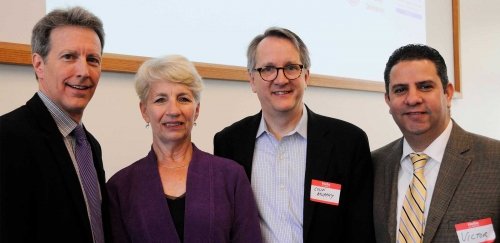To Repair Rather Than Punish, RIC Hosts Restorative Practice Symposium
- News & Events
- News
- To Repair Rather Than Punish, RIC Hosts Restorative Practice Symposium

“The goal of schools is to educate. Yet in Rhode Island more than 10,000 students were suspended last year, resulting in more than 43,000 days out of school,” said Colin Murphy, business and communications consultant for Youth Restoration Project (pictured third from left).
According to a national study, suspensions not only increase the likelihood of repeat offenses, they increase the likelihood of students being put back a grade or dropping out of school, said data analyst Megan Swindal of DataSpark at The Providence Plan.
Swindal and Murphy were among the presenters at the May 20 symposium “Restorative Practices across Rhode Island,” hosted by RIC’s Feinstein School of Education and Human Development. The goal of the conference was to introduce the full-capacity audience to an alternative to expensive and adversarial punishment systems.
(Pictured in photo, from left, Donald Halquist, dean of RIC’s Feinstein School of Education and Human Development; Julia Steiny, director and founder of Youth Restoration Project; Colin Murphy, business and communications consultant for Youth Restoration Project; and Victor Capellan, superintendent of the Central Falls School District. )
Murphy stated that “instead of a path of punishment, which leads to short-term fixes but potentially long-term damage,” restorative practices promises long-term healing for the entire community.
The “birth place” of restorative justice is New Zealand, said Julia Steiny, director and founder of Youth Restoration Project.
The Maori tribe met with their government leaders to point out why their system of justice was not working for their people: “Our kids enter your justice system at disparate rates – much like men of color in the U.S., particularly black men,” Steiny said. “Furthermore, when our youth come back they are worse. They’re angry, belligerent, adversarial, tough and they don’t integrate back into the community.”
“Our tribal traditions work a lot better,” Steiny continued. “Bring the offenders to our tribal circle and let them face what they have done. Bring your police and social workers, but most of all, bring the victims and their families, because our offenders need to hear what it was like on the other side of their actions.”
Steiny explained how offenders and their victims sit in the Maori circle and are held accountable for what they have done. Offenders create a plan whereby they agree to repair the harm they have caused. Once the elders have determined that reparations have been made, they welcome the offender back into the community.
A $3.68 million National Institute of Justice (NIJ) grant is testing the Maori method – “restorative practices” – in four Rhode Island high schools: Blackstone Valley Prep Mayoral Academy, Central Falls High School, The Greene School and Westerly High School, and in the Central Falls Middle School. As part of the NIJ grant, the Youth Restoration Project is designing and implementing restorative tools for each of these schools.
Staff from each of these high schools presented on-the-ground examples of restorative practices in their institutions, including the Maori method of “circling up” and “conferencing.”
“We had a situation at our school involving a number of students, which could have been an arrestable offense,” recalled Al Speaks, dean of culture at Blackstone Valley Prep Mayoral Academy. During the conferencing process, the offenders saw how their behavior had impacted the lives of their families and community. Appreciative of being given a second chance, the students created a school mural that read Everyone Deserves a Chance to Clean Up Their Mistakes.
“It’s a daily reminder for all of our students that you’re young, you’re an adolescent, you’re going to make mistakes, but you can always bounce back. We provide opportunities where they can have that second chance,” Speaks said.
According to Swindal, the outcomes of restorative practices, as reported by localized districts and schools across the country, include reductions in:
- absenteeism,
- serious behavior problems,
- office referrals and suspensions,
- multiple suspensions and
- racial disparities in discipline.
Swindal explained how DataSparks, also a partner in the NIJ grant, will collect data and measure the outcomes from the five Rhode Island schools. An evaluation of the outcomes will be conducted in Washington DC.
The symposium included small group discussions and a panel discussion, expanding the use of restorative practices into the areas of law, law enforcement, mental health and social service agencies in Rhode Island.
Restorative practices are designed for all child-serving professionals and parents, with the imperative to first work collectively to solve conflicts.
This symposium was sponsored by RIC’s Feinstein School of Education and Human Development, the Central Falls School District, Youth Restoration Project and the Mental Health Association of Rhode Island.
